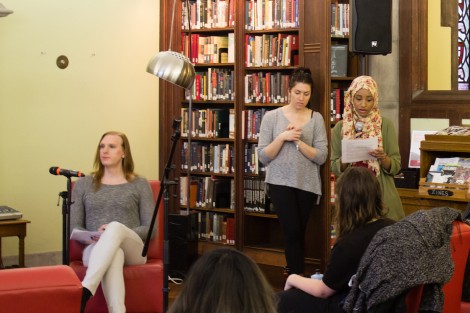“We’ve come so far in some ways in the conversations that we’re having, but we haven’t in so may other ways,” said Kristine Drakich, head coach of the Blues women’s volleyball team. “There’s almost like there’s this great distance from where we’re moving ahead, but we’re not picking up from behind.”
Drakich was one of four women from the U of T community to participate in the third installment of Hart House’s She Talks last week. She Talks rose out of the need for campus-wide conversation about issues women face in sport: sexism, misogyny, and sexualization.
Joining Drakich on the panel was national women’s dodgeball team member Savannah Burton, U of T masters student Alexandra Maris, and Blues rugby player Rachel Pham — all of whom have faced or fought against discriminatory and exclusionary practices in the world of sport because they are women.
For Burton, who is Canada’s first openly trans athlete to compete internationally in a team sport, the support she received from her teammates was enough to help her overcome the fears she had about returning to sport after her transition.
“I was ready to give up on playing sports, like I was ready to give up everything,” said Burton who, after taking a year off, was unsure of her future in sport. After being approached by a friend to join a rowing team, Burton explained that participating in a sport where she was relatively unknown helped her gain the confidence necessary to return to her favourite sport — dodgeball.
“It was a horribly terrifying thing to do and the unknown was just really hard to deal with,” Burton said. “I was so relieved because I was worried about how I was going to be perceived and how people would treat me, and it was a really positive thing and kept me going to dodgeball Canada.”
The acceptance and support Burton received from her team and sport community is a thread that was woven into every panelist’s experiences. For Pham, who has competed in a myriad of sports including field hockey, track and field, and rugby, the team aspect of sport helped her navigate some of the stigma and sexist stereotypes that are all too common for women in sport.
“Really for me what I loved so much… about sport boiled down to… the community. I am very fortunate to be on a team that is very inclusive, we are very tight” Pham said.
For Pham, the decision to pursue sports at an intercollegiate level meant making the decision between conforming to traditional societal standards of femininity or becoming a successful, competitive athlete. “I had to make the choice of going to be able to be more socially acceptable or have a larger more muscular body, and obviously I chose to be an athlete” she said.
Rounding out the discussion, Maris, who is pursuing a masters degree from the faculty of women and gender studies at U of T, explained that in order to combat sexist practices in sport, we need to start with how women are portrayed in the media. “If there were pictures of women doing sports everywhere, I think there would be a more social acceptance of women being in sport and doing it,” she said.
Drakich followed with a comment that those at U of T need to be critical of gendered practices on campus, so that we can foster a strong and supportive sport community.
“We have to look at what we do, how critical are we of what we do, from you know recreation to intramurals to varsity” Drakich said. “What you need to have is some form of a community that you can go to, where you know your voice gets heard and that change will actually work, action will happen.”



